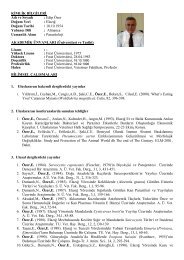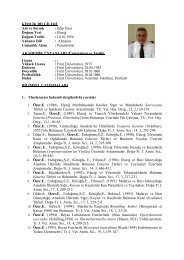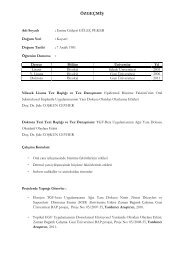KÄ°MLÄ°K BÄ°LGÄ°LERÄ° Adı ve Soyadı : Edip Ãzer DoÄum Yeri - Giresun ...
KÄ°MLÄ°K BÄ°LGÄ°LERÄ° Adı ve Soyadı : Edip Ãzer DoÄum Yeri - Giresun ...
KÄ°MLÄ°K BÄ°LGÄ°LERÄ° Adı ve Soyadı : Edip Ãzer DoÄum Yeri - Giresun ...
- No tags were found...
You also want an ePaper? Increase the reach of your titles
YUMPU automatically turns print PDFs into web optimized ePapers that Google loves.
TABLETop 5 think tanks in the worldGlobal rankingRanking in AsiaPublicorganizationsUni<strong>ve</strong>rsityorganizationsInternationalaffairsInternationalde<strong>ve</strong>lopmentEnvironmentpolicyHealth policyInternationaleconomyDomesticeconomyScience &technologySocial policyTransparency &go<strong>ve</strong>rnanceFirst Second ThirdBrookings Institution (US)Chinese Academy of SocialSciences (China)Chatham House (UK)Japan Institute ofInternational Affairs (Japan)Council on ForeignRelations (US)Center for Strategic andInternational Studies (Indonesia)Congressional ResearchService (US)Belfer Center for Scienceand International Affairs,Harvard (US)Center for Strategic andInternational Studies (US)Brookings Institution (US)Pew Center for GlobalClimate Change (US)Dept. of Health Policy andManagement, Harvard (US)Peterson Institute forInternational Economics (US)Brookings Institution (US)Max-Planck-Gesellschaft(Germany)Brookings Institution (US)Transparency International(Germany)Stiftung Wissenschaftund Politik (Germany)Hoo<strong>ve</strong>r Institute, Stanford(US)Brookings Institution (US)Center for GlobalDe<strong>ve</strong>lopment (US)World Resources Institute(US)Brookings Institution (US)Brookings Institution (US)National Bureau ofEconomic Research (US)RAND Corporation (US)Cato Institute (US)Amnesty International (UK)World Bank Institute (US)Center for InternationalDe<strong>ve</strong>lopment, Harvard(US)By Area of ResearchCouncil on ForeignRelations (US)O<strong>ve</strong>rseas De<strong>ve</strong>lopmentInstitute (UK)Chatham House (UK)American Enterprise Institutefor Public Policy Research (US)Bruegel (Belgium)Cato Institute (US)Bertelsmann Stiftung(Germany)Max-Planck-Institut fürGesellschaftsforschung(MPIfG) (Germany)Freedom House (US)FourthCarnegie Endowment forInternational Peace (US)Center for PolicyResearch (India)Norsk UtenrikspolitiskInstitutt (Norway)IDEAS, London School ofEconomics (UK)Carnegie Endowment forInternational Peace (US)Harvard Center forInternational De<strong>ve</strong>lopment (US)Potsdam-Institut für Klimafolgenforschung(Germany)RAND Corporation (US)Chatham House (UK)Peterson Institute forInternational Economics (US)Consortium for Science,Policy and Outcomes (US)Heritage Foundation (US)Human Rights Watch (UK)Center for Strategic andInternational Studies (US)Lowy Institute (Australia)Royal United ServicesInstitute for Defence andSecurity Studies (UK)Earth Institute, Columbia(US)Chatham House (UK)Deutsches Institut fürEntwicklungspolitik (Germany)Worldwatch Institute (US)Urban Institute (US)Institut für Weltwirtschaft(Germany)Heritage Foundation (US)Battelle Memorial Institute(US)Center for AmericanProgress (US)Brookings Institution (US)Source: Author’s arrangement based on evaluation presented in “The 2011 Global Go To Think Tanks Index Ranking,” published by International Relations Program, Uni<strong>ve</strong>rsity of Pennsylvania,January 2012FifthGi<strong>ve</strong>n the ambiguous nature of the definition of a think tank, it wouldbe difficult to estimate an accurate and meaningful number for thinktanks, just as in the case of ladybugs. E<strong>ve</strong>ry month, somewhere inthe world, new think tanks are being established to meet emergingchallenges, while others are being forced to disappear because oftheir organizational obsolescence or financial difficulties.Despite the problems of estimating the number of think tanks inthe world, the International Relations Program of the Uni<strong>ve</strong>rsity ofPennsylvania has tried hard to o<strong>ve</strong>rcome this difficulty and evaluateworld think tanks. According to a sur<strong>ve</strong>y report published in January2012 (“The 2011 Global Go To Think Tank Index Ranking”), there are6,545 think tanks in the world. The geographical distribution of thinktanks shows that the US has the largest number (1,815), and isfollowed by China (425), India (292), the United Kingdom (286),Germany (194), France (176), Argentina (137), Russia (112), Japan(103), and Canada (97).It should be noted that evaluating think tanks is not necessarily theequivalent of estimating the number of organizations, experts, andresearch papers. Likewise, we cannot judge the quality of a thinktank merely by examining its physical infrastructure or financialresources. In principle, a proper evaluation of a think tank might bebased on (1) the influential power of its recommendations onpolicymakers and public opinion, and (2) the quality of intellectualand innovati<strong>ve</strong> ideas in its recommendations.For better or worse, academic disciplines ha<strong>ve</strong> a common trait —relentlessly producing no<strong>ve</strong>l theories and evidence, and modifying ornullifying con<strong>ve</strong>ntional wisdom, as suggested by the German socialscientist Max Weber in his Science as a Vocation. This common traitmakes us evaluate accurately neither the influence nor the quality ofany particular recommendation. Especially, practical social sciencesincluding political science and economics are notoriously recondite,being replete with conflicting evidence, contradictory ideologies, andcompeting theories. E<strong>ve</strong>n in the fields of natural science andengineering that seem to be more scientifically rationalized, peopleha<strong>ve</strong> begun to realize the inevitability of progress that science cannotavoid; many scientific works ha<strong>ve</strong> become obsolete after theemergence of revolutionary ideas, including Copernicus’s theory ofthe uni<strong>ve</strong>rse and Einstein’s theory of relativity. Having witnessed thedisaster and tragedy of the 2011 Great East Japan Earthquake, manypeople ha<strong>ve</strong> started to doubt e<strong>ve</strong>n more the infallibility ofseismologists and nuclear engineers. For this reason, the influentialpower of a think tank or a specific recommendation is extremelydifficult to evaluate. Similarly, experts also find it difficult to deviseintegrated policy recommendations; they tend to disagree with eachother o<strong>ve</strong>r policy and strategic prescriptions.Furthermore, in general, applying wisdom and knowledge in thereal world is a cumbersome task; applying the latter might be easier,while the former is more difficult — as the German-Swiss writerHerman Hesse says in his Siddhartha, “Knowledge can be con<strong>ve</strong>yedbut not wisdom.” In other words, knowledge based on disciplinessystematically distilled from past data and experiences can be tosome extent applied by anybody; on the other hand, wisdom can beacquired and applied only by insightful policymakers.Despite such evaluation-related problems, the Uni<strong>ve</strong>rsity ofPennsylvania’s program tries to grade the influential and intellectualpower of think tanks worldwide (Table) by measuring their reputationamong experts and journalists.The Table shows that the top fi<strong>ve</strong> think tanks in the world are theJAPAN SPOTLIGHT • January / February 2013 13






